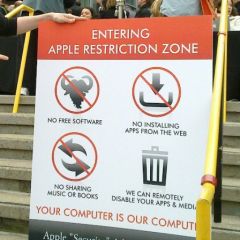I’m always saddened to hear about the passing of anyone before their time.
The recent announcements of the premature deaths of two very public individuals has brought wall to wall media coverage, very public displays of mourning along with speculation on the future of their life’s work.
Having never been a fan of the empire that Steve Jobs built, I posted online wondering when this fawning coverage would end. Someone remarked sarcastically that it would last about as long as the coverage of Jack Layton’s passing.
In thinking about the contributions to the world that these two individuals made, I am reminded of the 1988 U.S. Vice-Presidential debate between Michael Dukakis’ running mate Senator Lloyd Bentsen and George Bush I’s running mate Senator Dan Quayle.
In an exchange that was seen as the debate “knockout punch,” Bentsen said, “I served under Jack Kennedy. I knew Jack Kennedy. He was a friend of mine and you Senator are no Jack Kennedy.”
Steve Jobs was no Jack Layton.
I did know Jack Layton. I didn’t know him well, but over the years we frequently ran into each other at various events and chatted about many things. The last time I ran into him was a couple of summers ago in front of the the Steelworkers “Cecil Street” office in Toronto. We were chatting about the problems faced by the increasing numbers of unemployed workers who were falling off the EI system. I can’t imagine having that conversation with Steve Jobs.
Jack Layton dedicated his life to the rights of workers, and to helping the poor and the homeless. He fought against homophobia, domestic violence and initiated actions to protect the environment. He worked to repair the historic divide in Canadian society between Quebec and the “rest of Canada” on the basis of our common desire for social solidarity. He also worked for justice for the first peoples to inhabit this country and opposed Canada’s participation in the Afghan war.
Steve Jobs dedicated his life to the pursuit of profits for the Apple Computer Corporation. He did so by making tech products look pretty like they were designer furniture.
He accomplished this by having extremely tight control of the hardware and locking it down with proprietary software.
With mobile devices, not only does Apple maintain tight control of users, but also maintains total control over the developers of third party applications or “apps.” An app can’t be distributed through Apple’s app store without Apple’s permission. Sometimes this control becomes absolutely silly. At other times they’ve blocked apps that compete with Apple applications like iTunes.
Apple (along with Microsoft) has been the standard bearer in the battle to ensure that the future of web video is proprietary instead of open.
Jack Layton worked to build community. Steve Jobs used the community. His company built an operating system in which large chunks of code came from the community built, non-copyleft Free BSD Unix system. In the Apple hype machine, there was never much in the way of an acknowledgement that this was so. After all, Jobs was a “genius.”
Almost all consumer electronic products these days are manufactured under sweatshop conditions in Asia. Apple is no more guilty of this than any other manufacturer in this respect.
However, none of the tech giants built a hipster-oriented “cool” marketing machine like Steve Jobs. The mainstream media lapped up every Steve Jobs utterance, or hint of a product launch or hint of a hint of a product launch like he was some kind of messiah.
Steve Jobs could have used his hipster cool marketing machine to improve the conditions of Asian electronics workers. He could have been a Warren Buffet, who recently called for the mega rich in the U.S. to be taxed at a much higher rate then they currently are.
But, when workers at Wintek, one of Apple’s contract jobbing shops in Shuzhou, China, were poisoned making Apple touch screens, Steve Jobs chose to say nothing at all.
When large numbers of workers at another Chinese contract jobbing shop “Foxconn,” began committing suicide in substantial numbers, Jobs remarked that the number of suicides at Foxconn was “below the national average” in China. In response to criticism from a labour activist he said, “we’re all over it”. How? We don’t know. Other than that, Foxconn has erected suicide prevention netting in their facilities.
I have never been a fan of the monopolistic empire created by Bill Gates. But, in his retirement, Gates has put large sums of money into philanthropic projects, similar to the way steel tycoon Andrew Carnegie did a century ago. The public library I spent a great deal of time in as a kid was a “Carnegie” library.
Steve Jobs’ record on philanthropic activities is very slim. In fact when he returned to Apple in 1997 after being given the boot, he closed Apple’s philanthropic arm.
Perhaps had he lived longer, Steve Jobs might have awakened as a sort of 21st century Ebeneezer Scrooge and decided to spread his good fortune around.
He might have decided to liberate his closed hardware and software from its digital chains.
But I doubt it.



